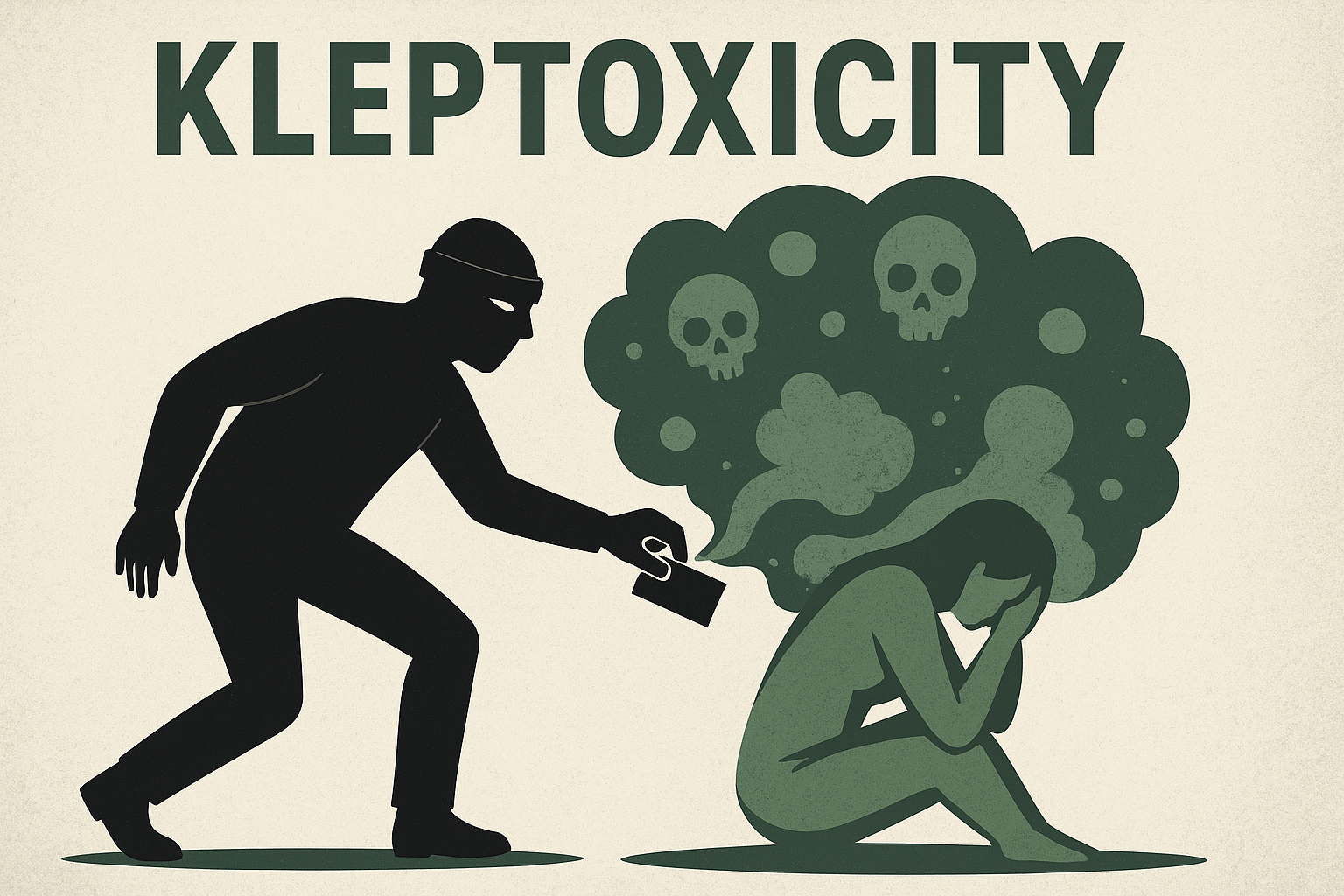The word kleptotoxicity is not yet a mainstream academic or dictionary term, but it carries powerful meaning when broken down into its components. Derived from “klepto” (Greek: kleptein, meaning “to steal”) and “toxicity” (the state of being harmful or poisonous), the term can be interpreted as the destructive, poisonous consequences of stealing. Unlike the simple act of theft, kleptotoxicity emphasizes the long-lasting harm caused by acts of appropriation, exploitation, or corruption.
Kleptotoxicity is a concept that can be applied to personal relationships, political systems, corporate behavior, cultural appropriation, and even environmental exploitation. It points to how taking what does not belong to you often leaves behind a residue of destruction—breaking trust, destabilizing communities, and harming ecosystems.
This article explores the layers of kleptotoxicity, tracing its psychological, cultural, political, and ecological impact, while also considering how societies can mitigate its effects.
The Meaning and Roots of Kleptotoxicity
To understand kleptotoxicity, we need to consider both sides of the term. “Klepto” is most familiar in the context of kleptomania, a compulsive urge to steal, and kleptocracy, a corrupt form of government where rulers enrich themselves through theft. “Toxicity,” meanwhile, describes poison, corruption, or any force that damages living systems.
Thus, kleptotoxicity represents more than an act of stealing—it represents the after-effects of theft: the loss of trust, the corrosion of fairness, the creation of inequality, and the destruction of balance.
Kleptotoxicity in Human Relationships
At the personal level, kleptotoxicity often manifests in ways people may not initially recognize. When one person steals from another—whether it is physical possessions, time, credit for work, or emotional energy—the consequences spread far beyond the immediate act.
-
In families, kleptotoxicity can appear when one member continuously exploits another’s resources. The “toxic” element emerges when this dynamic creates resentment, mistrust, and permanent fractures in relationships.
-
In friendships, kleptotoxicity shows up when generosity is exploited or when boundaries are ignored, leading to bitterness and distance.
-
In the workplace, stealing ideas or taking credit for another’s achievements is an intellectual form of theft that poisons teamwork and erodes morale.
These examples reveal how kleptotoxicity quietly eats away at the foundations of trust and respect that sustain human connections.
Kleptotoxicity in Culture and Society
The concept also applies to larger social and cultural structures. One of the clearest examples is cultural appropriation. When dominant groups adopt, commercialize, or distort cultural elements of marginalized groups without acknowledgment or respect, kleptotoxicity emerges. The act may appear harmless to outsiders, but the toxic consequences include loss of cultural identity, misrepresentation, and exploitation for profit.
Another form of cultural kleptotoxicity is intellectual property theft. Writers, musicians, inventors, and designers often face situations where their original creations are stolen or copied without recognition. Beyond financial losses, this creates emotional harm and discourages creativity, introducing a toxic cycle where originality is undervalued.
In a broader sense, systemic kleptotoxicity occurs when social structures normalize corruption, resource hoarding, or exploitation. In such cases, the theft is institutionalized, creating long-lasting inequality and disillusionment.
Kleptotoxicity in Economics and Politics
Perhaps the most striking examples of kleptotoxicity appear in political and economic systems.
-
Kleptocracy is the most obvious political form. In countries where ruling elites steal national resources, the toxic consequences include poverty, underdevelopment, social unrest, and collapsed institutions. Citizens are left disillusioned, and entire nations may be trapped in cycles of instability.
-
Corporate kleptotoxicity occurs when businesses exploit workers, monopolize resources, or destroy ecosystems in pursuit of profit. The “theft” of labor rights, wages, or environmental health leads to toxic long-term effects such as inequality, ecological collapse, and distrust in corporations.
-
Global economic kleptotoxicity happens when wealthy nations or companies extract natural resources from poorer regions without fair compensation. This kind of theft leaves behind toxic legacies: environmental destruction, economic dependency, and political instability.
These examples show that kleptotoxicity is not limited to personal wrongdoing—it can be a defining feature of entire systems of governance and commerce.
Kleptotoxicity and the Environment
One of the most urgent dimensions of kleptotoxicity lies in environmental issues. Humanity’s relationship with nature has often been extractive, treating ecosystems as resources to be stolen rather than systems to be sustained.
-
Deforestation steals habitats and biodiversity, leaving behind toxic effects such as soil erosion and loss of climate stability.
-
Overfishing robs oceans of balance, leading to toxic collapses in marine ecosystems.
-
Pollution steals clean air, water, and soil, creating health crises and long-term environmental damage.
-
Climate change is arguably the largest kleptotoxic phenomenon—humanity has stolen from future generations by exploiting fossil fuels, and the toxic effects are now visible in extreme weather, rising seas, and biodiversity loss.
Environmental kleptotoxicity highlights the urgent need to shift from a mindset of exploitation to one of restoration and reciprocity.
Historical Examples of Kleptotoxicity
Looking back at history, kleptotoxicity provides a useful lens for understanding the long-term damage caused by theft and exploitation.
-
Colonialism was a vast kleptotoxic project, where colonizing nations stole land, labor, and resources from colonized peoples. The toxic consequences are still visible today in economic inequalities, cultural erasure, and political instability.
-
The Industrial Revolution, while a period of progress, also involved kleptotoxic practices such as child labor, unsafe working conditions, and environmental degradation. The benefits were concentrated in the hands of a few, while the toxic consequences spread widely.
-
Modern corruption scandals, from political embezzlement to corporate fraud, showcase kleptotoxicity in contemporary society. Each act of theft creates waves of harm, eroding trust in institutions and damaging economies.
Psychological and Emotional Impact of Kleptotoxicity
Beyond economic or political outcomes, kleptotoxicity has deep psychological effects. Victims of theft often feel violated, powerless, and mistrustful. Over time, these experiences can lead to trauma, anxiety, or depression.
In systemic kleptotoxic environments—such as corrupt governments or exploitative workplaces—people may develop a sense of hopelessness or learned helplessness, believing that nothing can change. This psychological dimension is crucial, as it shows how kleptotoxicity damages not only structures but also the human spirit.
Strategies to Address Kleptotoxicity
If kleptotoxicity is so pervasive, how can societies address it? Several strategies can help mitigate its effects:
-
Promoting Transparency and Accountability: Strong institutions and ethical governance reduce political kleptotoxicity.
-
Protecting Intellectual and Cultural Rights: Laws and social awareness can safeguard originality and prevent exploitation.
-
Encouraging Fair Work Practices: Businesses that respect labor rights and provide fair compensation reduce kleptotoxic harm in workplaces.
-
Restoring Ecosystems: Environmental kleptotoxicity can be mitigated through reforestation, conservation, and sustainable energy practices.
-
Fostering Education and Awareness: Teaching values of respect, empathy, and reciprocity helps individuals avoid kleptotoxic behaviors in personal relationships.
Why Kleptotoxicity Matters Today
In a globalized and interconnected world, kleptotoxicity has never been more relevant. From climate change to economic inequality, the toxic consequences of theft—whether from people, cultures, or the planet—are becoming undeniable. Naming this phenomenon as kleptotoxicity gives us a sharper tool to analyze problems and to design fair, restorative solutions.
Read also: The Story of PGBrewskis: Origins, Growth, and Cultural Impact
Conclusion
Kleptotoxicity is a term that encapsulates the destructive power of theft in all its forms. Whether in personal relationships, political systems, cultural exchanges, or ecological interactions, theft rarely ends with the act itself. Instead, it spreads toxic consequences that corrode trust, stability, and fairness.
By understanding kleptotoxicity, societies gain insight into why exploitation is so damaging and why accountability, fairness, and sustainability are essential for a healthier future. The challenge of our time is not only to recognize kleptotoxicity but to actively build systems and relationships that replace theft with respect, reciprocity, and restoration.


